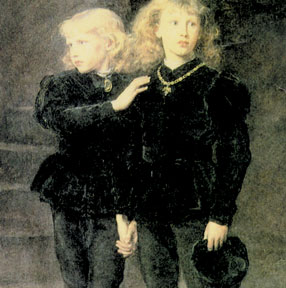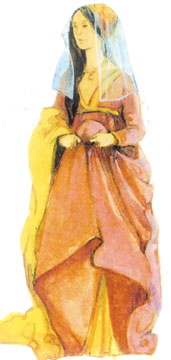Tower of London, witness to Richard's terror
by Gwen Herat
The War of Roses preceded the reign of Richard III who was born in
1452 and died at Bosworth Field in 1485 which makes his reign one of the
shortest in British history and exploded into one of the most famous as
well as infamous era of a king.
The War of Roses laid the foundation to what was to come even before
he ascended the throne with many gruesome killings and assassinations of
some who stood in the way dividing the Houses of York and Lancashire.
King Richard III achieved his mission even sacrificing the lives of the
two young and innocent princes along with his wife, Anne who was
poisoned.
 |
|
The two young princes
killed at the Tower of London by Richard. The painting is by
Millais |
There are two plays about his reign in Henry IV Parts 1 and 2. He did
well but died a tormented royal. The plays display the wars against
Northern rebels and the way his son, Prince Hal turns to be an addict
but later gives up all his habits demonstrating he was fit to be a king.
Shakespeare's greatest comedy character who appears in many of his
plays, Sir John Falstaff is one of his drinking partners. Later, the
descendants of Edward III who fought for the throne resulted in dividing
the Houses of York and Lancashire paving the way to all conflicts and
tension.
Marriage
When Henry married Princess Margaret of Anjou she is seen as a bitter
old woman in Richard III. Too occupied with his religion, Henry had
grown up to be a pious man. However, his wife Margaret makes up for him,
leading his troops into battle. But Henry is captured and deposed giving
Edward the opportunity to crown himself.
Henry's son is killed at the battle of Tewkesbury though the
Lancastrians fight back but are finished off. Henry who is held as a
prisoner at the Tower of London is still a threat to the Yorkists. So,
Margaret is banished and together, Edward and Richard kill Henry.
This is the scenario that Shakespeare prepared before he embarked on
writing Richard III. The stage is set but not yet. Because this tragedy
had to be absolutely and historically correct. So, he derives his facts
from chroniclers of his own time who are Raphael Holinshed and Edward
Hall.
Earlier, Hall too depended on the accuracy of Richard's life based on
by Sir Thomas More's personal contacts. As a boy, More had lived in the
household of John Morton who was the Bishop of Ely in Richard III but as
a friend and adviser to Henry, he has had inside information. Yet, he
was on the side of Tudors.
Propaganda
The Earl of Richmond was the king's father and Elizabeth, Henry
VIII's daughter and queen in Shakespeare's time. This led to Tudor
historians to assume that Richmond was right when he seized the throne.
There was also another school of thought where critics dismissed this
theory and accused Shakespeare of propaganda for the Tudors.But one must
remember that Shakespeare was more concerned in a highly tensed drama
over propaganda.
He wrote the play making it much shorter time when and where events
occurred. One example in the play that stands out is the scene where he
sees his brother being led to the Tower while Richard goes straight to
Henry's funeral and courts Lady Anne.
 |
|
Lady Anne, the widow of
Edward, the son of King Henry VI who is wooed by Richard
over his coffin. |
Here, there is a lapse in history. It was seven years before Clarence
was imprisoned that Richard married Anne. Critics assumed that
Shakespeare opted to write in this manner regardless of history, to
bring into focus Richard's ruthlessness.For me this does not fit
anywhere because if I recall faintly the two events I wrote at an
examination on British history, there is a flaw somewhere. Probably the
time gap between Henry's death and Richard's marriage to Anne.
Villain
Shakespeare was determined to portray Richard as a villain much more
than he was, taking a cue from Nicolo Machiavelli's book The Prince,
where he advocates that a ruler must be cunning and ruthless to acquire
anything he needs. Shakespeare emphasises his ruthlessness, drawing
attention to his deformed body and a hunched back but I am sure history
has it that he had a very handsome face which he used for his conquests
and succeeded even luring Anne into marriage. For those who may have
read The Hunchback of Notre Dame, there is a similarity between the two
but the difference lay in the pathetic face that the Hunchbach has as
against the incredibly attractive face of Richard.
The most foul deed was the killing of the two innocent princes, young
Edward and his brother. But Shakespeare is also very vague about their
assassinator who could have been someone else who would have wished to
please Edward. There is yet another view that the boy prince may have
outlived Edward and put away by Henry VII. Whoever did it, he placed
their bodies under the staircase of the Tower and during the time of
King Charles II's reign, they were reburied in the Westminster Abey.
Religious leanings
Those who support the view that Richard is innocent do so because of
his religious leanings they prove with a well-thumbed prayer book which
he used regularly and presently preserved in the archives.Others argue
as to why Richard remained silent when people started suspecting him
when they found the princes missing in the Tower gardens.
This led many including his strong supporters to join Richmond's
forces, along with the public outrage that lost him the Battle of
Bosworth.
With a heavy trail of mass murder committed against those whom he
hated, Richard fights bravely as the war rages. He wishes to kill
Richmond in a single combat and when the two meet at Bosworth, Edward is
slain by Richmond. One of the most colourful tragedies of Shakespeare
where scores of royals that dot British history, are seen walking in and
out it as and when it pleases the Bard to make this colossal tragedy
more spectacular to please his audience.
Not being a historian, Shakespeare had the audacity to overcome this
problem by pinching into other resources that were historically correct.
But with time, his readers, scholars and audiences came to understand
his frailties and overlooked the errors giving him a platform to do
whatever pleased him.
|


